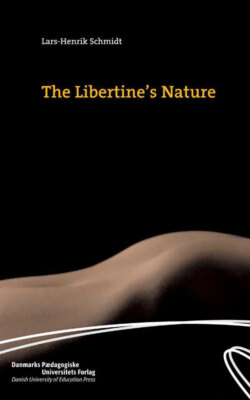Читать книгу The Libertine's Nature - Lars-Henrik Schmidt - Страница 17
На сайте Литреса книга снята с продажи.
Sade and Kierkegaard
ОглавлениеThus, Sade is epistemically bound to the contradiction between law and nature, but his concern constitutes such a radical insistence on nature that the excess is blasting its way toward a new problematic. The way the problem presents itself might be seen more clearly in the light of the opposite position: a position that insists so radically on the law that it is also pointing towards a new problematic. We should not search for a position that insists on a little naturalism and a subsequent feeble relativism; we should search for such a radical insistence on the law that nature is suspended and relative existence is made absolute. This is why I suggested already in my introduction that Sade’s counterpart is Kierkegaard. Sade-Juliette meets his equivalent and illustrative opposition in Kierkegaard-Justine. Opposites they are, but in their eroticization of philosophy and blasting of the ethical problematic they are brothers.
In other words, structurally speaking one can take an interest in Sade’s naturalism for the same reason that one must take an interest today in Kierkegaard, the most radical querist not of nature like Sade but of the law as the basis for morality. Working with this unlikely couple defines the boundaries of a new problematic concerning an ethics beyond law and nature, and the interest in one of them is justified with reference to the other.
Sade is the sharpest critic of the idea that a normative foundation for nature can be derived and traced: if we define morality as the limits to what one can do out of regard for and with regard to the other, then Sade is critical of the notion of natural regard. If nature teaches us anything, its moral is the misfortunes of virtue and the prosperity of vice (lex Sade). In this way he contrasts with Kierkegaard, which can be demonstrated in the manner that each of them relates to sensuality. In Kierkegaard sensuality is marked by elaborate fore-thought; in Sade it is fore-told. Everything must be said in Sade – everything must also be said.
While Kierkegaard claims that the law has reality and that one law can suspend another, Sade claims before him that nature has reality and that one conception of nature suspends another. But both law and nature are thought of radically here. If there is to be an ethics, it has to come from law, claims Kierkegaard. If there is to be an ethics, it has to come from nature, claims Sade; though, of course, neither of them would have expressed it in this way. What is interesting is that an ethics cannot exist on either of these foundations. For Kierkegaard, ethics comes before the law, so to speak, and above and beyond the law. For Sade, ethics comes before nature, and above and beyond nature; that is, as something other than the prevalent conception of law and nature. They defend a more-than societal law or societal nature. For both of them it is a matter of acting out talents, which then results in a kind of usefulness, a philosophy of utilitarianism but without utilitarianism’s principle of happiness, which, on the contrary, is concrete and concerns the happiness of as many as possible. To maintain the idea of being useful to as many as possible as telos seems abominable to these gentlemen. And they agree as well that evil demands talent – contrary to goodness.
The two figures can then be used to play through the two traditional bases for ethics (law, nature), because they are at once the foremost expositors and critics of these two bases. But both of them speak within a discourse of love, a discourse on generalized sexuality. They discuss spiritual and physical love (narcissism as Christian charity and sexuality as the acting out of passions, respectively). They also share the para-philosophy that uses literature.
Kierkegaard wrote Deeds of Love, and Sade wrote Crimes of Passion. In all likelihood, today one would have to write ‘Misdeeds of Love’ in order to carry out a complete analysis of the problematic they span – but neglect. Common to them as well is their ignorance of eroticism: the point at which the other’s relating is further involved, at which one must play along, and one’s desire is the other’s desire. At the same time, in eroticism there is always a rival and as such the relation may be interpreted as a social coincidence and made into an object for social analytics.
